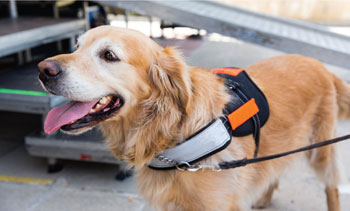Airlines can't ban service animals by breed, weight but can ban some species
 The Department of Transportation says airlines cannot categorically exclude certain breeds of dogs or cats as service animals and cannot ban service animals over a certain weight but can exclude some species, according to its updated statement of enforcement priorities.
The Department of Transportation says airlines cannot categorically exclude certain breeds of dogs or cats as service animals and cannot ban service animals over a certain weight but can exclude some species, according to its updated statement of enforcement priorities.
The notice came Aug. 8 when the DOT, which regulates the transportation of service and emotional support animals under the Air Carrier Access Act, released its "Final Statement of Enforcement Priorities Regarding Service Animals." Airlines had 30 days after that to conform their rules with the federal policy.
Concerns expressed in recent years by people with disabilities, airlines, flight attendants, and other stakeholders—including the AVMA—have pushed the department to consider changing its requirements for service animals. These concerns include fraudulent representations of pets as assistance animals—that is, service or emotional support animals—and safety issues posed by animals in the cabin.
Last year, the department gave advanced notice of proposed rule-making under the ACAA and, at the same time, issued an interim statement to give notice of how the DOT would enforce existing requirements surrounding service animals during the rule-making process. Now a final statement has been issued. While this guidance is not legally binding, the priorities announced could serve as a preview for new regulations that the department hopes to enact by next summer.
One of the key changes from the 2018 interim DOT statement of enforcement priorities is that DOT may initiate enforcement actions against airlines if they ban an entire dog or cat breed, such as pit bull–type dogs. Airlines can, however, ban snakes, other reptiles, ferrets, rodents, and spiders. They can also decide on a case-by-case basis whether to allow other types of service animals.
Other major changes are that airlines can require lobby check-in for emotional support and psychiatric support animals and can prohibit service animals that are too young to be trained to behave in public.
Further, airlines can't ban the following: the total number of service animals to be transported in the plane's cabin; service animals over a certain weight, without regard to specific factors; and service animals on flights lasting eight hours or more.
The guidance document states that, if a passenger's disability is not clear, airlines may ask limited questions to determine his or her need for the animal. Also, airlines will be allowed to ask for documentation related to the service animal's vaccinations, training, or behavior, as long as it helps determine whether an animal poses a direct threat to others.
Dr. Gail Golab, AVMA chief veterinary officer, said she was encouraged to see the DOT's consideration of comments the AVMA had submitted. Recognizing this, the AVMA and others in the Service Animal Coalition sent a letter Aug. 9 to express their support and thank the DOT for its efforts to clarify its enforcement priorities.
Regarding emotional support animals, the letter states: "In 2018, over a million passengers on U.S. airlines traveled with ESAs in the cabin, and as a result, both airports and airlines have seen a sharp increase in incidents caused by ESAs. These incidents have ranged from mauling and biting to urinating and defecating—all unacceptable behaviors on an airplane. This misbehavior not only threatens the health and safety of our passengers and crew, but also passengers with disabilities traveling with legitimate service animals."
The AVMA still has concerns about the DOT's continued classification of service animals as including animals beyond dogs and miniature horses, which is inconsistent with definitions under the Americans With Disabilities Act, as well as the department not distinguishing between emotional support animals and psychiatric service animals.
The Association will continue to work with the DOT and airlines to push for clarification in these areas.
Recently, the AVMA and AVMA PLIT jointly presented continuing education sessions with United, American, Southwest, and Delta airlines during AVMA Convention 2019, held in August in Washington, D.C. These sessions were meant to educate the veterinary team about the process of animal transportation and how to work with clients who are traveling with their pets or with assistance animals. Similar sessions will be presented at upcoming veterinary conferences and will be available online at AVMA Axon in coming months.
Related JAVMA content:
Navigating the pitfalls of pet air travel (July 1, 2019)
Tips for advising owners about to fly with their pets (July 1, 2019)
Pet travel website updated for pet owners, veterinarians (March 15, 2019)
AVMA, United reach agreement on form for assistance animals (May 1, 2018)
Supporting real assistance animals (Sept. 15, 2017)